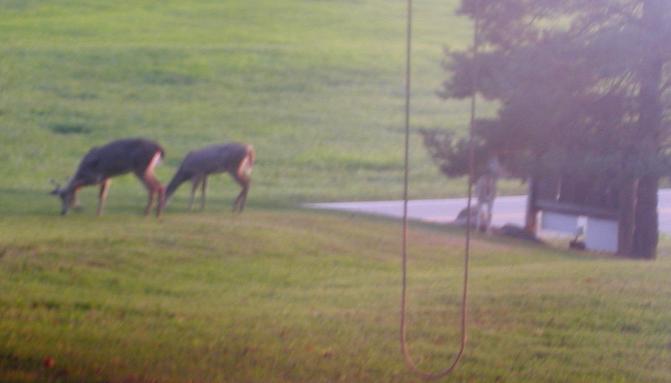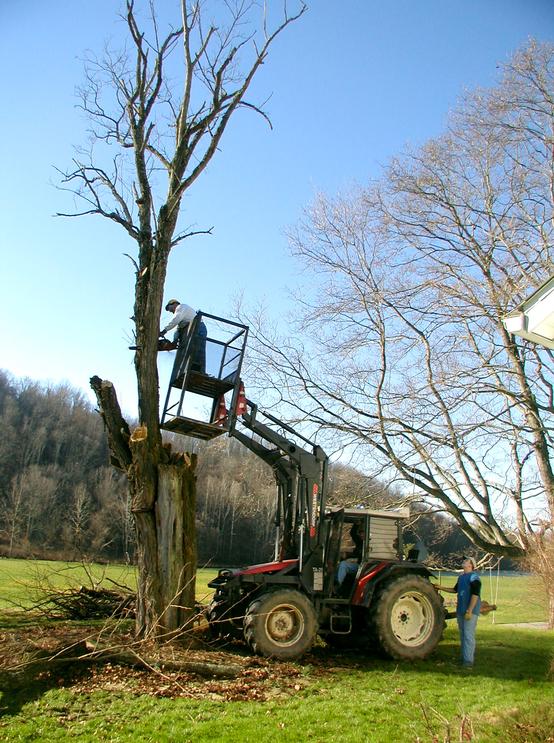
| Next Chapter | Previous Chapter | |
| Appendix: Changes in farming technology | Contents | Chapter 61: Our Old House |
Now my story is told. Not all I know, but the best, and it’s time to go on to other things. To those who have made it all the way through, I hope you have some idea of how some of us lived in the second half of the 20 th century in Central Appalachia, and what we look back on. The book occupied about ten years of my spare time, and it is a message from one period to later ones. Some things you may wonder about: there is no fiction here, all is true. Those of us who were in C. L. A. N. R. O., Inc. rejected the hired assassin’s help instantly on moral grounds, a “holy horror” of that sort of thing. But we weren’t so dumb as to fail to recognize the multitude of practical problems, including the possibility it was a set-up. Hired assassins are more likely to work for affluent corporations and governments than for poor semi-political groups. The lesson from the story is: that sort of thing is not very far from any of us.
Has my life and experience been typical of farmers? No. In some respects I have been very fortunate. We bought the Jesse Run farm at an advantageous time. I have never had a serious fight, legal or otherwise, with a neighbor, we have had a reasonably good income from teaching to live on, and problems like bad health, “substance abuse” and mental illness have stayed far enough away to leave no mark on us. We have been able to work out our economic interests within the larger family. On the other hand, both my wife and I have worked very hard, seven days a week mostly, have taken no vacations before retirement, and otherwise lived modestly, carefully putting all back into the farm and house what we could, using some borrowed money without mishap. We’ve had some bad luck, too, but nothing overwhelming.
Formerly there was a bias against rural life, because in the past living away from cities meant living away from good schools, and many other advantages. Now, living around 2000, electronic communication is so excellent and transportation so well developed that you can have anything in the country that anyone has in the city, except personal contact with certain elite groups. If you consider that a loss .
(Illustration 62-1)

Deer on the lawn about dark
What will the future bring? I look forward to better medicine, at least for those that can afford it. I have enjoyed the growth of Science, and that too, I expect to continue to grow, although there are religious groups that want to fight it. Technology in the form of electronic communication, computers, more nutritious and easier to prepare foods, more efficient use of fuel, general physical comfort will grow, if no great war breaks out and no great depression hits, which are distinct possibilities. Baring catastrophe I expect better manners between wider sections of individuals within society. There will certainly be better machines for doing routine work.
(Illustration 62-2)

Taking down the locust tree in the front lawn 2006. The “basket” was designed by the author, and constructed by Ed Andrews.
I fear increasing concentration of control of the means of production and control of raw materials. Through the seventies and early eighties I received a little yellow sheet published by the Department of Labor which chronicled the movement of productive wealth (capital) to a smaller and smaller fraction of the American population. And I have seen this change in other ways since. This has evil possibilities. The “defense industry” and certain other industries are moving us into something like perpetual war. They can’t profit without war. There is a stealth movement in far right religion that is very dangerous becoming apparent in this decade (2000’s).
Exhaustion of raw materials for industry, particularly petroleum, is a major concern. Someone has said “If a man believes in infinite expansion when there is limited resources he must be an economist or a fool.” The energy corporations have no stake in what must follow the petroleum era and do not want to encourage conservation or develop a successor to oil nor do they want to take responsibility for the degradation of the means of living in the future. Few Americans understand the control the corporations have or the certainty and time scale of the decline of petroleum energy which is now well known. Neither do they understand the devious activity of the Federal government in obtaining raw materials and control of foreign nations to facilitate interests of American corporations.
The growth of overlapping elites in government, business, media and some churches is a form of social decay, a deliberate movement away from the ideals of democracy. The astounding failure of our educational system to produce knowledgeable, work oriented people who are tolerant of diversity, is a particularly disgusting failure of life at this time. General ignorance and lack of public discussion of most issues in public life, and the growth of an ethic that elevates the power of some individuals and of the nation above ethical behavior appalls me. Fundamentalism is a lack of true understanding, in
(Illustration 62-3)

Eva and Tristan, children playing
Christianity, Judaism, Islam, Hindu and all the other religions. I fear a movement away from decency, true liberality (what is called Liberalism has become doctrinaire), and good faith, toward central power, poverty for most folks and eternal conflict. This is a United States that would barely be recognizable to those who fought in the American Revolution.
So, good reader, I leave you and your kin and friends to live out the future. You have some control of what you come in contact with. Make the best of it.
(Note: This chapter was written before 9/11/01. These matters were becoming apparent to careful observers before the revolution which has occurred since.)
| Next Chapter | Previous Chapter | |
| Appendix: Changes in farming technology | Contents | Chapter 61: Our Old House |
Copyright © 1998, 2006, 2008, 2011 S. Tom Bond (stombond at hughes.net)